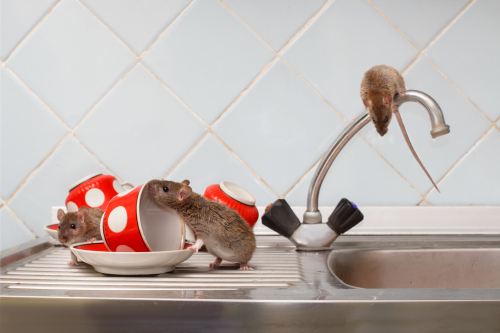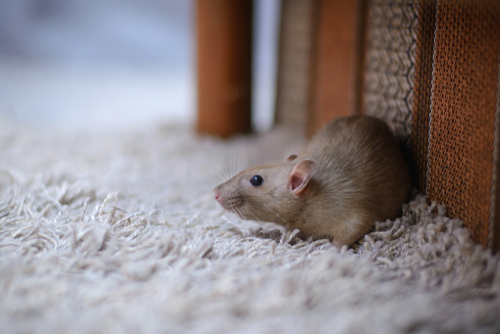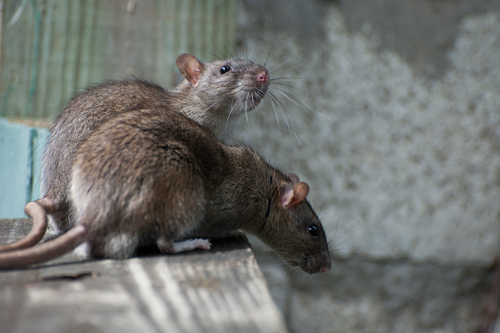
Discovering that your home is infested with rats or mice can be unsettling and alarming. These pests not only cause damage to your property but also pose health risks to you and your family. If you suspect a rat or mouse infestation, it’s crucial to take immediate action to eliminate the problem. To help you identify these unwanted guests, we have compiled a list of common signs that indicate rats or mice have made their way into your home.
Unusual Noises
One of the first signs of a rodent infestation is strange noises coming from your walls, attic, or crawl spaces. Rats and mice are typically active at night, so you might hear scratching, scampering, or squeaking sounds when the house is quiet. These noises are a result of their movement, nesting activities, and communication with other rats or mice. Pay close attention to any unusual sounds, especially during the night, as it could indicate the presence of rodents in your home.
Droppings
Rat and mouse droppings are a clear indication of their presence. These droppings are typically small and resemble black grains of rice or small pellets. You may find them in the areas where rodents are active, such as the kitchen, pantry, or near their nests. Take caution when handling droppings, as they can carry harmful bacteria and parasites which can be a health risk. Wear gloves and use proper sanitation methods to clean up any droppings and disinfect the area.
Gnaw Marks
Rats and mice have incisor teeth that continuously grow, and they gnaw on objects to keep these teeth trimmed down. Look for gnaw marks on wood, plastic, insulation, or electrical wires. Rodents may chew on furniture, baseboards, or even walls in their search for food and nesting materials. If you notice any signs of gnawing, it’s essential to address the issue promptly to prevent further damage to your property and potential electrical hazards.
Nesting Materials
Finding shredded paper, fabric, or other soft materials in your home may indicate the presence of rats or mice. These materials are often used by rodents to build their nests, which are typically hidden in secluded areas such as attics, crawl spaces, or inside walls. Inspect these areas for any signs of nests or nesting materials. If you come across a nest, it’s advisable to contact a pest control professional to handle its removal safely.
Grease Marks and Tracks
Rats and mice have oily fur, and as they navigate through your home, they may leave greasy smudges or tracks along their usual paths. You may notice dark, greasy marks along walls, baseboards, or near entry points like holes or gaps. These marks are a result of the rodents repeatedly brushing against surfaces as they move around. Follow these tracks to identify potential entry points and take measures to seal them off, preventing further infestation.
Rub Marks
Similar to grease marks, rats and mice may create rub marks along their regular routes. These marks are caused by their bodies repeatedly brushing against walls or other surfaces. They are usually seen as smudges or dark streaks, particularly in corners, narrow gaps, or along baseboards. If you notice rub marks, it’s an indication that rodents are actively using those routes and requires attention to prevent further infestation.
Sightings
Perhaps the most obvious sign of a rodent infestation is actually seeing rats or mice in your home. Spotting these pests during the day is uncommon, as they are primarily nocturnal creatures. However, if you see them during daytime hours, it may indicate a larger infestation or a lack of available food sources. If you do see a rat or mouse, take immediate action to address the problem and contact a pest control professional for assistance.
Unpleasant Odors
A strong, musky odor in your home can indicate the presence of rats or mice. Rodents have scent glands that produce a distinctive smell that can become more noticeable in enclosed areas or areas where they congregate. If you notice an unpleasant odor that persists despite your efforts to eliminate it, it’s worth investigating for a possible rodent infestation.
Summary
Being aware of the common signs of rat and mouse infestation can help you identify and address the problem promptly. Keep an eye out for unusual noises, droppings, gnaw marks, nesting materials, grease marks and tracks, rub marks, sightings, and unpleasant odors. If you suspect a rodent infestation, it’s advisable to contact a professional pest control service to assess the situation, implement effective extermination methods, and provide guidance on preventing future infestations. Early detection and prompt action are key to minimizing the damage and health risks associated with rats and mice in your home.
Need Exterminators in Bartlesville, OK?
Family owned and operated since 2003, we have earned a reputation for providing quality, reliable, timely, and affordable pest control services to the residents and businesses of Oklahoma and Kansas. Our team of highly skilled, experienced, and certified staff uses only use the most technologically advanced treatment methods while respecting your home needs. We specialize in the removal of ants and carpenter ants, termites, cockroaches, fleas, spiders, bed bugs, stinging insects, mice, rats and more! We offer monthly, bi-monthly, quarterly, semi-annual and annual service for your convenience and peace of mind! Contact us today to learn more about what we can do for you!

If you have ever had an unwelcome furry visitor scurrying around your home, you know how alarming it can be. Mice are not only a nuisance, but they can also spread diseases and cause damage to your property. It’s important to understand why mice may be attracted to your home in order to prevent infestations. In this blog post, we will discuss some common causes of mice being attracted to your home.
1. Accessible Food Sources:
Mice are attracted to your home because they are in search of food. If you have accessible food sources, such as open garbage cans, unsealed containers, or spilled food, it’s like an open invitation to these pesky rodents. It’s important to keep your kitchen and pantry clean and tidy, store food in sealed containers, and regularly take out the garbage to discourage mice from being attracted to your home.
2. Clutter and Storage:
Mice are attracted to clutter and areas where they can hide and build their nests. If you have a lot of clutter in your home, such as boxes, piles of paper, or old furniture, it provides the perfect environment for mice to thrive. It’s important to declutter your home and organize your storage areas to eliminate potential nesting spots for mice.
3. Cracks and Holes:
Mice can squeeze through tiny openings, so any cracks or holes in your home’s exterior can provide an entry point for them. Check your foundation, walls, windows, and doors for any gaps or openings and seal them properly. This will not only help prevent mice from entering your home but also improve energy efficiency.
4. Water Sources:
Just like food, mice are also attracted to water sources. Leaky pipes, dripping faucets, or even pet water bowls left out overnight can provide a water source for these rodents. Be sure to fix any plumbing leaks and clean up any spills or puddles promptly to remove the attraction for mice.
5. Pet Food:
If you have pets, their food can be a magnet for mice. Leaving pet food out all day and night can attract mice, as they are always on the lookout for an easy meal. To prevent mice from being attracted to your home, feed your pets at designated times and remove any uneaten food promptly.
6. Garbage and Compost:
Mice are scavengers, and they can easily find food in your garbage or compost pile. Make sure your garbage cans have tight-fitting lids and clean them regularly. If you have a compost pile, keep it well-maintained and away from your home to avoid attracting mice.
7. Neighborhood Environment:
Sometimes, the cause of mice being attracted to your home can be related to the overall environment of your neighborhood. If you live in an area with a high density of mice, it increases the chances of them finding their way into your home. In such cases, it’s important to be extra vigilant in keeping your home clean and free from any potential attractants.
Summary
Mice can be attracted to your home due to a variety of reasons. Ensuring that your home is free from accessible food sources, clutter, cracks, and holes, and maintaining a clean and tidy environment will help prevent mice infestations. Additionally, being mindful of water sources, pet food, and garbage can also deter mice from being attracted to your home. By taking these preventive measures, you can keep your home mouse-free and maintain a healthy and safe living environment.
Need Exterminators in Bartlesville, OK?
Family owned and operated since 2003, we have earned a reputation for providing quality, reliable, timely, and affordable pest control services to the residents and businesses of Oklahoma and Kansas. Our team of highly skilled, experienced, and certified staff uses only use the most technologically advanced treatment methods while respecting your home needs. We specialize in the removal of ants and carpenter ants, termites, cockroaches, fleas, spiders, bed bugs, stinging insects, mice, rats and more! We offer monthly, bi-monthly, quarterly, semi-annual and annual service for your convenience and peace of mind! Contact us today to learn more about what we can do for you!
Nothing beats coming home on a cold winter day to a nice warm home and being able to snuggle on the couch with a cozy blanket and a steaming cup of coffee or cocoa. Unfortunately, you’re not the only one who finds your nice, warm home particularly inviting this time of year.
Once the weather gets cold, rodents will be looking for a warm place to make their home for the winter. If you don’t want these uninvited guests infiltrating your home for the holidays—and we mean the rodents, not the in-laws—we can help. Here are seven tips from Excellence Pest Control, your local rodent control service in Bartlesville, OK, to help keep the rodents out of your home this winter:
- Fix any plumbing leaks: Don’t allow a leaky faucet or standing water to turn into a water supply. Fix leaking plumbing, both inside and outside your home, to help prevent giving rodents the water resources they need to move in.
- Trim your trees and any house-climbing plants: Branches that are too close to your roof or windows make excellent bridges for rodents to gain access to your home. Climbing ivy and other plants can also help give rodents easy access.
- Store dry goods and pet food in metal or glass containers: Leaving dry goods like rice, oatmeal and even pet food in the paper containers they come in is an open dinner invitation to any rodents in the area. Protect your home by making sure to store any dry goods in non-chewable containers.
- Maintain a clean yard: Yard debris like leaf piles, branches and even the leftovers of your garden make the perfect hiding places for rodents. To help keep rodents far away from your home, be sure to maintain a clean yard.
- Store your firewood away from your home: People tend to stack their firewood close to their home for easy access, but rodents love to make woodpiles their home for the winter. If your woodpile is right next to your house, rodents are just one step away from getting inside.
- Check your home for holes or access points: Door and window frames and other areas of your siding or roof often have holes that will give rodents easy access to your home. Before the really cold weather hits, do a quick inspection of your home and plug up any holes bigger than ¼ inch.
- Put your trash away: Be sure to keep all your trash bags in a sealable trash can. Garbage is a number one attraction for rodents. Keeping your garbage put away will help keep rodents and even other larger, more robust animals from finding a winter meal among your leftovers.
By following these few simple steps, you can help protect your home from pesky rodents this winter. However, if you do find yourself having a problem with mice or rats in your home, call the team at Excellence Pest Control for rodent control service in Bartlesville, OK.
When the weather is cold and the ground is covered in snow, there’s no better way to warm up than to stay indoors. Unfortunately, rodents have the same thought process as people do when the cold weather rolls in. If you’re not careful, rodents can settle down into your warm house and have easy access to your food. Not only can these rodents feast upon your snacks, but they might also damage your home and even spread serious diseases. Knowing what attracts them and whether your home is infested is the first step to effective rodent removal in Bartlesville, OK.
How rodents enter your home
A rat or mouse can fit through the smallest openings on their quest to get out of the cold. A full-size rat can fit through an opening the size of a quarter, while a mouse is able to easily slip through a hole smaller than a dime! Those cracks and crevices in the walls or foundation are the perfect entryway. Not to mention they can also enter through an open window, a poorly sealed chimney or even underneath your front door!
How to tell if your home is infested
Most homeowners never realize they have a problem until they actually see droppings, teeth marks on furniture or damaged food packaging—and some don’t notice anything until they actually catch sight of a rat or mouse. The best way to tell if you have any unwanted critters is to watch out for any signs of nesting in dark and warm areas, such as in kitchen cabinets. Pay special attention to any squeaks or other sounds coming from the walls in the middle of the night, as well.
Preventative steps to keep pests out
Follow these steps before the weather drops below freezing to prevent rodents from entering your home this winter:
- Trim any branches that hang over the roof of your home
- Never plant trees or bushes within a foot of the house
- Keep the inside of your home free of any debris and remove any potential hiding places
- Store all food, especially pet food and garbage, in airtight containers
- Never leave dirty dishes out in the sink overnight
- Seal any cracks between the windows and their frame
- Replace the weather stripping on the bottom of your front and back door annually
Removing rodents from your home
Unfortunately, these steps won’t be much help if the mice and rats have already found a warm bed in your home. If that seems to be the case, then it’s best to call a professional for rodent removal in Bartlesville, OK to eliminate the problem quickly and efficiently. An experienced exterminator will know the best ways to remove the rodents before examining your home to find any vulnerable points where they may have entered.
After the initial service, it’s best to schedule a regular appointment to ensure your home is continuously safe from any rodent intruders. Call Excellence Pest Control today to learn more about rodent removal in Bartlesville, OK, and to schedule a visit.



